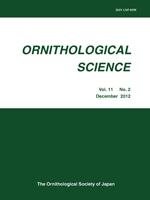Willow Tits Poecile montanus produce calls when they discover food sources. These calls function to attract conspecific and heterospecific individuals to the food site, thereby facilitating the formation of mixed-species foraging flocks. Since individuals may gain feeding/anti-predator benefits while foraging in mixed-species flocks, the ability of food discoverers to signal food presence would be of adaptive value. Here, I tested this idea by comparing the calls of Willow Tits between food and non-food contexts. Field observations at artificial feeders showed that Willow Tits typically produce calls composed of a single note type (tää note) when discovering food supplies, whereas they usually combine two distinct note types (introductory and tää notes) when moving through forests without a food source. These results indicate that Willow Tits use subtle variation in the note composition of calls to discriminate between food and non-food contexts, and this may serve to regulate the movements and cohesion of mixed-species flocks.
How to translate text using browser tools
1 December 2012
Calling at a Food Source: Context-Dependent Variation in Note Composition of Combinatorial Calls in Willow Tits
Toshitaka N. Suzuki
ACCESS THE FULL ARTICLE

Ornithological Science
Vol. 11 • No. 2
December 2012
Vol. 11 • No. 2
December 2012
acoustic communication
Call
Food discovery
Poecile montanus
Willow Tit




